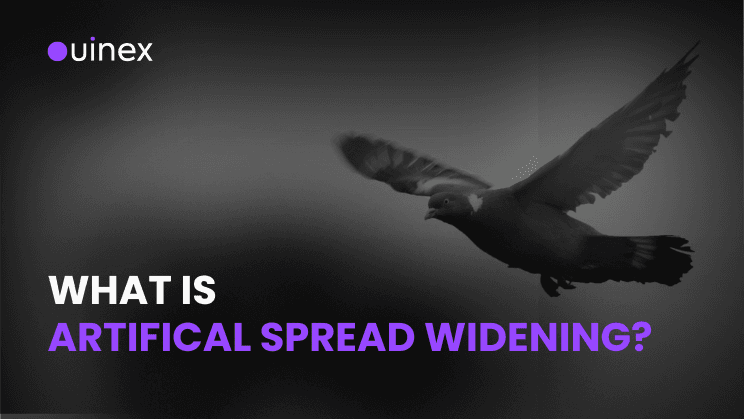
Artificial Spread Widening: Don't Let Your Exchange Play You
Artificial spread widening is when the bid-ask spread is deliberately inflated to make trading more expensive than it needs to be. It’s not natural market volatility it’s manipulation.
Key Takeaways
- The spread is the difference between buy (ask) and sell (bid) price. That difference is usually pocketed by (paid to) the market makers and the exchange.
- On most exchanges you only see what the spread was when you check your stats after you made a trade.
- Artificial spread widening inflates trading costs.
- Manipulation and lack of competition cause artificial widening.
- Ouinex has spreads tighter than slim-fit jeans and show your spread in real-time as you trade. No nasty surprises.
The spread is the tiny gap between the buy price and the sell price of an asset kind of like a mini toll you pay when trading.
Imagine you’re at a currency exchange booth at the airport:
- They’ll sell you euros at $1.12 each.
- But they buy YOUR euros for $1.10.
So if you give them $1.12 you get a euro. But if you give the euro back to them, you only get $1.10. That 2 cent difference? That’s the spread.
It works the same in trading. The buy price (ask) is always a little higher than the sell price (bid). That difference goes to the exchange, market maker, or broker as a fee.
So:
Spread = The hidden cost of doing a trade.
The smaller the spread, the better for you. The issue? Most exchanges don’t even show you the spread up front as you trade. We do. We put it front and center, but at this point in time, we’re in the minority when it comes to this.
What is Artificial Spread Widening?
Artificial spread widening is when an exchange or market maker deliberately increases the spread beyond normal market conditions.
Think of it like this:
- In a healthy market, the spread is tight reflecting the natural balance of buyers and sellers.
- With artificial widening, the exchange or market maker inflates that difference, pocketing the extra profit.
Artificial Spread Widening in Action
Let’s say the actual market spread for BTC is tight:
Bid: $29,998 | Ask: $30,002
But on a shady exchange or due to dodgy market-making behavior, you suddenly see:
Bid: $29,990 | Ask: $30,010
Same asset, same conditions just now it’s artificially expensive to get in or out. This hurts traders, especially those placing tight orders or running bots.
How Does Artificial Spread Widening Happen?
- Manipulation: Exchanges can manipulate the spread to increase their revenue, especially during volatile periods.
- Lack of Competition: If there are few market makers, they can collude to widen spreads.
Why is Artificial Spread Widening Bad?
- Increased Costs: It directly eats into your profits, making trading more expensive.
- Unfairness: It creates an uneven playing field where the exchange has an unfair advantage.
- Loss of Trust: It erodes trust in the exchange and the market.
Ensure You Get the Best Spreads
Before you trade, bear in mind the following:
- Use platforms with proven liquidity and transparent order books.
- Watch how spreads behave during low activity this is when widening games often show up.
- Always check your stats to see what the spread was after a trade.
- If your fills are consistently off the mark, it might not be your strategy it might be the spread.
Ouinex: Fair Spreads, Always
Ouinex is committed to transparent and fair spreads:
- No-CLOB Model: Our execution model reduces the potential for spread manipulation.
- Market Maker Competition: We foster competition among market makers to keep spreads tight.
- Real-time Visibility: You see the spread upfront, before you trade.
We believe in transparency and tight spreads, so if you want to stop losing money to spreads, you’ve come to the right place.
FAQs
What exactly is a “spread” in trading?
A spread is the difference between the price you can buy an asset for (ask price) and the price you can sell it for (bid price). It's like a small toll every trader pays—usually tiny, but it adds up fast. The smaller the spread, the better it is for you.
What is artificial spread widening?
Artificial spread widening happens when an exchange or market maker deliberately inflates the spread beyond what’s normal for the market. This forces traders to buy higher and sell lower than they should, which increases trading costs and reduces profits. It's not natural—it’s manipulation.
Why would an exchange want to widen spreads?
Profit. Wider spreads mean more money per trade for the exchange or market maker. It’s especially tempting during volatile periods or when there’s low trading activity and fewer people are watching closely.
How can I tell if an exchange is widening spreads artificially?
Look at the spread behavior during off-peak hours or when volatility spikes. If prices seem fair but you’re getting bad fills or execution costs are strangely high, it might be due to artificial widening. Transparent exchanges like Ouinex show you the spread in real time so there’s no guesswork.
What does Ouinex do to protect traders from artificial spread widening?
Ouinex uses a no-CLOB model (no centralized limit order book), which prevents a single party from controlling the market. We also encourage market-maker competition to keep spreads naturally tight. And best of all you see the actual spread before you trade. No hidden costs.